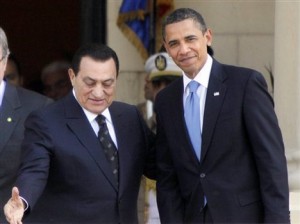
President Barack Obama of the United States and President Hosni Mubarak of Egypt. Source: http://article.wn.com/
The Egyptian protests came as a great surprise to many Americans, not because anti-authoritarian protests are rare, but because the U.S. is one of the main backers of the 30-year-old Mubarak regime. How did the U.S. begin supporting a ruthless dictatorship and why has this been ignored for so long, in the mainstream media, even as extensive coverage of the triumph of “democracy” in Iraq continued?
Many Americans tend to have an innocent view of international relations. They see it mainly as an arena where the good guys battle the bad guys — the good guys, like the U.S., have some sparse failings but nonetheless show good intentions. History, however, tells a completely different story. The U.S. has violently intervened in over 72 countries since the end of World War II, spending vast amounts of money propping up U.S.-friendly regimes across the Third World. We can compare the U.S. with nations that have focused on foreign aid and peacekeeping missions rather than violent intervention. Countries such as Norway and Sweden have not suffered a single military or terrorist attack since the end of World War II, despite their minimal military and espionage spending.
There are also those Americans who, faced with this historical reality, come to the conclusion that the foreign policy of the U.S. government is intrinsically evil. Yet this would also be a fallacy. The U.S. government is not an abstract, immobile entity. It is an institution consisting of a set of rules and individuals who have the collective power to shape U.S. policy. There are two basic ways to influence how the government utilizes its power — the mandate of elections and the influence of special interests. The failures of U.S. foreign policy to benefit the general interest of the American people can be attributed to a substantial extent to the dominant influence of special interests in the decision-making process during the last 60 years.
One of the main benefactors of foreign conflicts, for example, is the defense industry. In his farewell address, President Dwight Eisenhower warned Americans about the looming danger of a military-industrial complex. In return for authorizing foreign wars and assigning defense contracts, the defense industry provides vast electoral support to those that succumb to its interests.
Multinational corporations and organized crime also benefit from foreign interventions. The ITT Corporation, for example, worked in conjunction with the CIA to overthrow the democratically-elected left-wing government of Chile in 1973. In Florida, the remnants of the Havana mafia continue to support the deeply unpopular embargo on Cuba, which has proven to be highly costly for both the American public and the common Cuban people, while giving the Castro regime a perpetual excuse for oppressing its people.
The problem with the excessive influence of special interests is not limited to the U.S. foreign policy. Domestically, many defense contractors continue to be rewarded with expensive contracts that are far above market value. The tendency to reward big, inefficient companies — who then spend vast sums of their excess profits lobbying the U.S. government — is the main cause for our extremely high military budget. The U.S. spends about $730 billion per year (22 percent of the 2010 federal budget) on the military, nearly as much as the rest of the world combined. In comparison, the federal government spends only about $6 billion per year on foreign aid for developing countries, discounting Egypt.
Yet most academics agree that economical development is the key to democratic and peaceful regimes, while violent conflicts tend to cause more violent conflicts. If the U.S. government wants to spread democracy around the world, it is making a very poor attempt at it. The current U.S. foreign policy is simply not designed to benefit the rest of the world or the average American citizen and until people become more aware of the issue, it will persist in wreaking havoc, supporting dictatorships like the Mubarak regime and bankrupting the American people.





